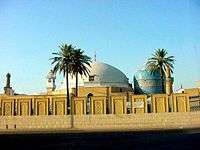Harith al-Muhasibi
Al-Muhasibi (781–857) was the founder of the Baghdad School of Islamic philosophy, and a teacher of the Sufi masters Junayd al-Baghdadi and Sari al-Saqti.
His full name is Abu Abdullah Harith bin Asad al-Basri. He was born in Basra in 781. Muhasibi means self-inspection/audit. It was his characteristic property. He was a founder of Sufi doctrine, and influenced many subsequent theologians, such as al-Ghazali.
He wrote many books about theology and Tasawwuf (Sufism), among them Kitab al-Khalwa and Kitab al-Ri`aya li-huquq Allah ("Obeying God's Permits").
In al-Khalwa, in a discourse on fear and hope:
- Know that the first thing that corrects you and helps you correct others is renouncing this world. For renunciation is attained by realisation, and consideration is attained by reflection. For if you think of this world, you will not find it worth sacrificing your soul and faith for it. But you will find your soul worthier of honour by ridiculing this world. This world is abhorred of God almighty and the messengers. It is an abode of afflication and a station of foolishness. Be on your guard from it.[1]
Al-Khalwa's argument elsewhere cites al-Hasan al-Basri. The above pericope was later transplanted into a fictional response by al-Hasan to 'Umar b. 'Abd al-Aziz.[2]
References
External links
- Mu'atabah an-Nafs by Harith al-Muhasibi
- Al-Ri'ayah Li'Huquq-il-lah by Harith al-Muhasibi
- (French) Treatise of Faith by Imam Al Muhasibi
